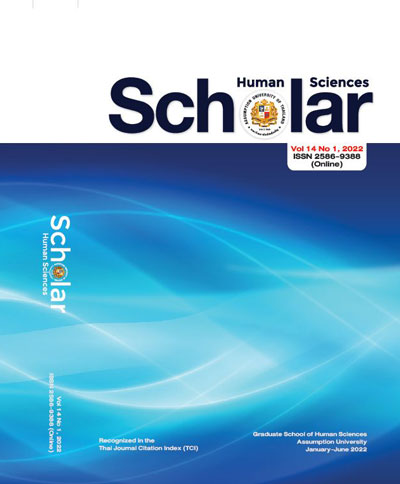THE RELATIONSHIP OF TEACHERS’ PERCEPTIONS TOWARDS SCHOOL CLIMATE AND THEIR COMPETENCIES AT PHETTHANOM SCHOOL IN BANGKOK, THAILAND
Keywords:
School climate; Teachers’ competencies; ThailandAbstract
This study aimed to explore the relationship between teachers’ perceptions of school climate and their competence at Phetthanom School in Bangkok, Thailand.
The objectives of the study were: (1) to identify the teachers’ perceptions towards school climate, (2) to identify the level of teachers’ perceptions towards their competencies, and (3) to determine the relationship between teachers’ perceptions towards school climate and their competencies at Phetthanom School in Bangkok, Thailand. A response rate of 100% was achieved.
This finding showed that teachers’ perceptions of school climate were high at Phetthanom School, and the level of teachers’ perceptions of teachers’ competencies was high at Phetthanom School. Therefore, the hypothesis was accepted as the study discovered a positive relationship between teachers’ perceptions of school climate and their competencies at Phetthanom School in Bangkok, Thailand.
Using frequency, percentage, mean, standard deviation, and Pearson product-moment correlation coefficient, the research found that Pearson correlation r is .655 and Sig. is .001, which is smaller than .05. Pearson correlation r is .655, which means that the relationship between school climate and teachers’ competencies is strongly positive. Therefore, the researcher rejected the null hypothesis and accepted the research hypothesis: “There is a significant relationship between teachers’ perception towards school climate and their teachers’ competencies at Phetthanom School in Bangkok, Thailand.”
References
Achwarin, N. A. (2009). The study of teacher Competencies of teachers at schools in the three provinces of Thailand. Retrieved from http://repository.au.edu/handle/6623004553/12698
Becenti, C. J. (2009). “Is there a relationship between the level of professional learning community attainment, teacher effectiveness, and student achievement” ProQuest dissertations and theses database. Retrieved from Berkowitz, M. W. & Bier, M. C.https://www.emerald.com/insight/content/doi/10.1108/IJEM-05-2016-0090/full/html
Collie, R. J., Shapka, J. D., & Perry, N. E. (2012). School climate and social-emotional learning: Predicting teacher stress, job satisfaction, and teaching efficacy. Journal of Educational Psychology, 104(4), 1189-1204. doi:10.1037/a0029356
Garsky, P. & Blau, I. (2009). Online Teaching Effectiveness: A tale of two Instructors. Retrieved from https://pdfs.semanticscholar.org/02d8/916fcd65678bb2bc96cfd0a015f622eb469d.pdf?_ga=2.16424053.2141569512.1570524749-1153551566.1570524749
Huyen, T, T (2003). A Study of Teacher Competencies Performance and Needs for Teacher Competencies Improvement in Thai Binh Province, Vietnam, Master Thesis, Graduate School of Education, Assumption University, Thailand.
Kirchner, J.V (2009). Teacher Effectiveness; The Relationship of the Teacher Work Sample. Retrieved from http://books.google.com/books?isbn-1109087659
Medley, D. M. (1977). Teacher Competencies and Teacher Effectiveness. Virginia, USA: The American Association of Colleges for Teacher Education.
OECD (2013), PISA 2012 Results: What Makes Schools Successful (Volume IV): Resources, Policies and Practices, http://dx. doi.org/10.1787/9789264201156-en.
OECD/UNESCO (2016). Education in Thailand: An OECD-UNESCO Perspective, Reviews of National Policies for Education, OECD Publishing, Paris. http://dx.doi.org/10.1787/9789264259119-en
Samdal, O., Nutbeam1, D., & Kannas2, B. W. (1998). Achieving health and educational goals through schools. Health Education Research, 13(3), 383-397
Smith, L. D. (2009). School climate and teacher commitment. Tuscaloosa: The University of Alabama.
Selamat, N, Samsu, N. Z & Kamalu, N.S. M. (2013). The Impact of Organizational Climate on Teachers’ Job Performance. Educational Research, 2(1), 81.
Taguiri, R. (1968). The Concept of Organizational Climate in Taguiri Rentato and George H. Litnwin eds, Organizational Climate: Exploration of a Concept. Boston: Division of Research: Graduate School of Business Administration. Harvard University.
Xiaozhou, X. (2018). Educational Policies and Legislation in China.161-169.
Zullig. K. J., Huebner, E. S. and Patton, J. M. (2011). Relationships among school climate domains and school satisfaction. Psychology in the Schools, 48: 133-145.doi:10.1002/pits.20532




